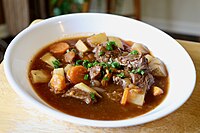
Back مطبخ أيرلندي Arabic İrlandiya mətbəxi Azerbaijani Ірландская кухня Byelorussian Irská kuchyně Czech Irische Küche German Gastronomía de Irlanda Spanish آشپزی ایرلندی Persian Irlantilainen keittiö Finnish Cuisine irlandaise French Cócaireacht na hÉireann Irish
This article has multiple issues. Please help improve it or discuss these issues on the talk page. (Learn how and when to remove these messages)
|



| Part of a series on the |
| Culture of Ireland |
|---|
 |
| History |
| People |
| Mythology and folklore |
| Religion |
| Art |
Irish cuisine (Irish: Cócaireacht na hÉireann) encompasses the cooking styles, traditions and recipes associated with the island of Ireland. It has developed from antiquity through centuries of social and political change and the mixing of different cultures, predominantly with those from nearby Britain and other European regions. The cuisine is founded upon the crops and animals farmed in its temperate climate and the abundance of fresh fish and seafood from the surrounding waters of the Atlantic Ocean. Chowder, for example, is popular around the coasts.[1] Herbs and spices traditionally used in Irish cuisine include bay leaves, black pepper, caraway seeds, chives, dill, horseradish, mustard seeds, parsley, ramsons (wild garlic), rosemary, sage and thyme.
The development of Irish cuisine was altered greatly by the Tudor conquest of Ireland in the late 16th and early 17th centuries, which introduced a new agro-alimentary system of intensive grain-based agriculture and led to large areas of land being turned over to grain production. The rise of a commercial market in grain and meat altered the diet of the Irish populace by redirecting traditionally consumed products (such as beef) abroad as cash crops instead.[2] Consequently, potatoes were widely adopted in the 18th century and essentially became the main crop that the Irish working class (which formed a majority of the population) could afford.[3]
By the 21st century, much traditional Irish cuisine was being revived.[4] Representative dishes include Irish stew, bacon and cabbage, boxty, brown bread (as it is referred to in the south) or soda bread (predominantly used in Ulster), coddle, and colcannon.
- ^ "Is this the best fish chowder in the world?". The Irish Times.
- ^ POUSSOU, Jean-Pierre (14 March 2015). "Changing eating habits in Ireland and the Scottish Highlands". Mémoire(s), Identité(s), Marginalité(s) dans le Monde Occidental Contemporain (12). doi:10.4000/mimmoc.1733.
- ^ "Great Famine". Britannica. Encyclopædia Britannica, Inc. Retrieved 8 September 2022.
- ^ Murphy, Diarmaid (3 July 2021). "Exploring evidence of lost and forgotten Irish food traditions in Irish cookbooks 1980-2015". Folk Life. 59 (2): 161–181. doi:10.1080/04308778.2021.1957429. ISSN 0430-8778.